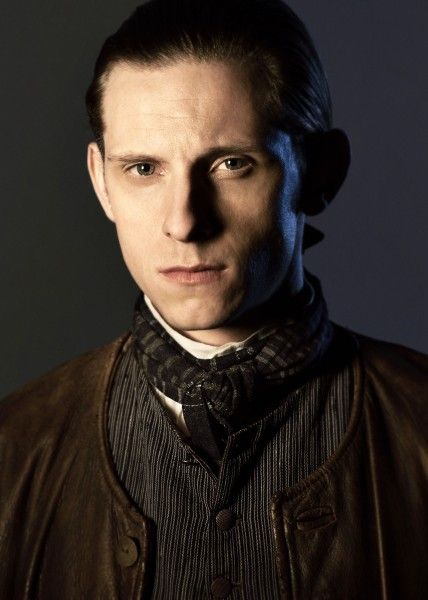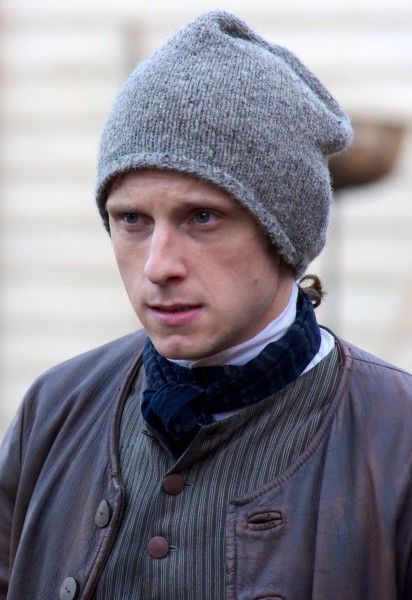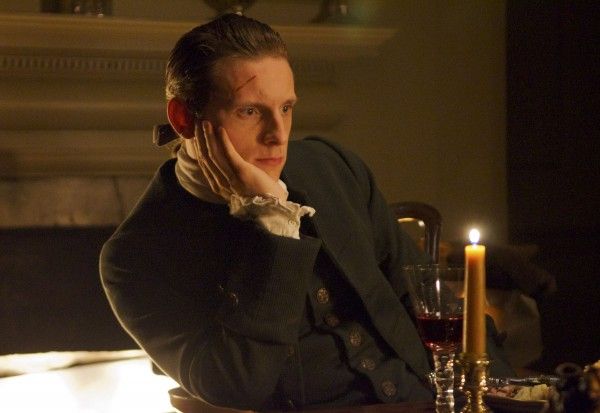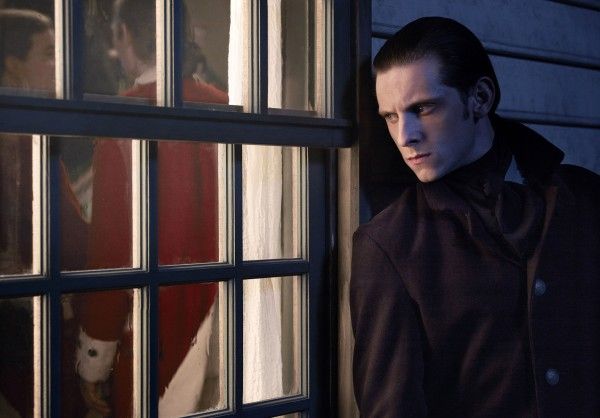From showrunner Craig Silverstein (Nikita) and based on Alexander Rose’s book Washington’s Spies, the new AMC drama series Turn tells the untold story of America’s first spy ring. A historical thriller set during the Revolutionary War, the show follows Abe Woodhull (Jamie Bell), a farmer living in British-occupied Long Island who bands together with his childhood friends to form the Culper Ring, which is an unlikely team of secret agents who not only went on to help George Washington turn the tide of the war, but also gave birth to modern spycraft.
During this recent interview to promote the new show, actor Jamie Bell talked about what attracted him to this project, why he was drawn to television, the responsibility in playing someone who existed and who did something quite incredible, in terms of the history of this country, that spies were hated during that time period, what most surprised him when he did his research, the complexity of the relationships with the women in Abe Woodhull’s life, how being a new father influences his performance, why Abe Woodhull is appealing to audiences, even with all of his flaws, and the challenges of the physical side of the role. Check out what he had to say after the jump, and be aware that there are some spoilers.
Question: What was it about the premise of this show and your character that made you want to be a part of it?
JAMIE BELL: I think it was the sense that Turn is a spy thriller, and that’s a genre that really fascinates me, in general. I love the high stakes that the show has. There’s a compelling drama that’s created between the characters. And the fact that it’s a historical story that has espionage, intrigue, high stakes and love triangles, and things like that. It was all of that stuff. It was just crammed full of stuff. And the fact that it’s a true story that not many people, if any, knew about, I felt it was a really good opportunity and a really good idea for a television show. Also, AMC is a fantastic network that does diverse programming, and does it at a really good level and of great quality. I knew that a show like this would need that, and I knew that it would be important to be at a good network. So, it was a combination of the material and the network. It just seemed like a really great opportunity and a really great piece of television for people to tune into for an hour on the weekend. I would want to watch it.
Were you ever interested, before now, in making the leap from film to television?
BELL: Not particularly. I’ve been admiring what television has been doing, in terms of the quality of the acting, but I was never really looking for TV. This just came along and it was so rich and complex, and the character was so great with such an arc to him. Coupling that with AMC, it was just intriguing. But I was aware and have been aware, in the last five or 10 years, just how much TV is impacting the world. I remember when I first came to America and I saw posters for TV shows and I was like, “What?! Why does a television show deserve space on a billboard?” I came from England and we never put TV on billboards. That’s crazy! That’s reserved for movies. The landscape was automatically different from England. TV is a big business here. But then, also, in the last five or 10 years, it’s gotten really good. In some ways, it’s surpassed films, in terms of the way people invest in these shows and invest in these characters, and give up so much of their time to follow these people’s stories. In that regard, the landscape has definitely changed, and I wanted to be a part of it.
You’re playing a real life character on this show. Do you feel a particular obligation in playing someone who really lived and whose story hasn’t been told before?
BELL: I think there is a responsibility in playing someone who existed and who did something quite incredible, in terms of the history of this country. There isn’t much that is not about this character. Pretty much next to nothing. What we do know really comes from the correspondence between him and George Washington, and that only gives us a limited account of what this man was like and what his experiences were like. There isn’t a monument erected in his name. In Washington, he’s not in marble. He’s of that level, to this country. He’s that important to this country’s beginnings. So, the responsibility is huge because we’ve literally never seen him before and we’ve never heard of him before. Now, we’re up close and personal with him. We really want to maintain the sense that this was an everyman. He was a farmer. He was a family man. Just like a lot of people are today, he was a blue collar kid, who suddenly had this incredible calling and responsibility put on his shoulders.
Do we not know much about him because being a spy, at that time, was considered a dishonorable thing?
BELL: Well, that was part of it. Spies were hated. It was a cowardly game to be a spy. To be honorable was to wear a uniform, fight on the battlefield and engage in the rules of warfare. But, to be a spy was a cowardly thing to do. You were less than a man, if you were a spy. We know who Nathan Hale is because he got caught. The reason we don’t know who Abraham Woodhull is, is because he didn’t get caught. He was a part of an incredibly successful spy network because they were all best friends. They wouldn’t betray each other’s friendship, and I think that’s why it worked.
As you researched this role and did this show, what’s been the biggest surprise about this time in history for you?
BELL: It wasn’t so black and white. What this show does, and what I’ve learned through Alexander Rose’s book and through Craig Silverstein’s scripts, is that a lot of this was families turning on themselves. The measure of divide between these people was right down the middle, literally between father and son, like it is on our show, or husband and wife, or brothers. It divided people on the inside. That, to me, is fascinating. I think the show really looks at that, a lot. Also, it was really a younger sibling trying to separate from an older brother. The colonials felt British already because they were. They came here many years before. The people who were fighting back were second or third generation, and they were separating from themselves almost. It was a sibling spat, and I liked that. I didn’t really fully understand those kinds of politics and those kinds of issues, and between Alexander’s book and the scripts, that brought that into sharper focus for me. Other than that, I was surprised by just what life was like, in those days, and how aggressive the British were. Washington was close to losing the war, a lot of the time, and that’s something that we’ve been focusing on, in our first season. It took George Washington time to become a great spy master. He wasn’t amazing at everything, to begin with. I didn’t know much of that stuff either. So, it’s been a real lesson for me, but luckily, this show doesn’t feel like a lesson. There are so many complexities going on between people and families.
Do you think you would have liked to have lived in that time?
BELL: No. In the midst of a war, having an occupied force stripping my natural rights and having occupied forces living in my house with me, it would not have been a good time to have been around. Life was just difficult then. If your crop went bad, you might be done, forever. There was no coming back from that. It was a very hard time to live. People wanted to be on the winning side, but they had no idea what that was. That is a lot of pressure and a lot of stress. So no, I don’t think I would have liked to have been around, at that time.
The women in Abe’s life are very influential on his decisions. Will we see more of those relationships develop through the season?
BELL: Absolutely! The complexity of the situation of having a war going on around you and what that delivers to you is that you have to figure out which side to take. It’s a split down the middle for a lot of people, at this time in history. For Abe, he has a conflict because the woman he’s with is much more loyalist leaning and just does what they say, hoping that it will work out for the best. Whereas his true love and real dream girl that he’s supposed to be with has a very strong patriot leaning. So, he’s totally split. The mother of his child thinks one thing. The woman that he loves and really should be with thinks another thing. And those worlds do collide, in this show, and neither one is right. Both are just a political perspective. Abe goes back and forth, constantly. He’s not sure if he’s making the right decision. He doesn’t want to risk his family. But he has to follow his heart, his passion and his belief. It’s that pendulum swing that happens. His relationships with those two women definitely have their highs and lows. Where Abe and Mary start in the pilot is incredibly different from where the season finale finishes, and it’s the same between Abe and Anna. Lots of stuff happens between those three characters. Anna Strong was also a spy, in her own right. She is just as crucial to this network succeeding as Ben Talmadge is and as Abe Woodhull is.
Do you think Americans or the British have a skewed idea of the Revolutionary War, and do you think this show will help with that?
BELL: People are smart. They have a general sense of what happened. What makes this show different and what makes it a great piece of TV, even for people who don’t love spy stories, it is as much a story about these young people and what it took for them to defy their own families, spouses and best friends. They risked everything to go fight in this war. I think that there’s also the history buff who has an insane attention to detail and will notice things that we might have gotten wrong. I don’t think we’ve gotten a lot wrong, but there are people who are very steeped in the rich complexity of Revolutionary War, and this will be a turn on for them because we’re bringing these heroes to light. I didn’t learn about the Revolutionary War in school, at all. I don’t think many English people did learn about the Revolutionary War. I remember learning about the Boston Tea Party and the tea in the harbor, but we didn’t go into the war and the politics and taxation without representation, or even the Founding Fathers. In America, you do learn about the Founding Fathers, but maybe not the complexity.
Does being a new father yourself color your performance as a father trying to protect your family?
BELL: It played into it a lot. At the time that I shot the pilot, I was an expectant father, so we hadn’t had the baby yet. When you have a child, you are just immediately changed forever. You put yourself second. Your child comes first, and everything that you do is with them in mind. When you relate that to someone who has lot of high stakes on his shoulders and is taking a path that literally could mean the end of his life, that weighs incredibly heavy on Abe Woodhull’s shoulders. So, knowing that I was going to become a father, and then becoming a father as we continued shooting the season, it played into it a lot. The stakes will always be raised so much higher for me, as an actor, and so much higher for the character knowing that, whatever trouble he gets into, and he does get into trouble a lot, as the show progresses, the first thing that he’s thinking about is, “I might never see my son again.” But, it’s also the reason for doing it. He wants his son to grow up in a free country. He wants his son to inherent a country where he can make his own decisions. That’s a heavy thing, and it’s a great thing to fight for. It’s a difficult position. Do you endanger your child to fight for the right thing, or do you keep your mouth shut and let your child grow up in a world where their natural rights are stripped away from them?
Abe Woodhull was a real person whose life is documented in Alexander Rose’s book. How much did you base the personality of the character on what was in the book, and how much did you develop on your own?
BELL: Very little of that is actually documented, in terms of personality. We knew his name, we knew where he came from, we knew his alias, we knew that he was a bit of a stickler when it came to being reimbursed by George Washington, and we knew he was paranoid. I remember an account from Alexander’s book where he was writing some kind of information down and someone came into the room he was staying in, and he panicked because he was writing very sensitive information that, if someone saw, he would get found out. He threw his papers up and pushed his chair back and freaked out because he thought he’d been caught. I’m not sure how that was documented, but I remember reading it in Alexander’s book. And from that, I was like, “Wow, this guy is literally on edge, all the time.” It turned out to be the maid, who was just coming to tidy his room. He was just on edge, the entire time, as you would be. If you’re living two lives and you’re lying to everyone, you’re bound to slip up, in some way, you’re bound to get something wrong, and you’re bound to get found out. The one thing I really liked was just how intensely paranoid and terrified he was that it was going to go wrong, at any moment. And there are high stakes in that because he has a family. And then, there is a love triangle going on, and this battle is going on around him. We dug as much as we could to find out who he was, but then, we had to embellish it. He’s a non-traditional, yet entertaining character.
What do you think about Abe Woodhull’s appeal, as a character, even with all of his flaws?
BELL: What we wanted to achieve, early on, is the fact that this is an ordinary guy in an extraordinary situation. He’s a farmer. He’s not a spy master. He’s not militarily inclined. He’s not on the war path. He literally wants nothing to do with it. Starting out with a strong repressive character who’s shut down and who’s living a lie in an unhappy marriage is a good place to start because we have somewhere to go. In this show, there is so much other stuff happening with the real historical battles. It’s very much an ensemble piece. This isn’t just Abe Woodhull’s story. There are so many other characters in the show. There are about 10 principles, or maybe more. So, we wanted to start with this guy being shut down and repressed. He’s against the war and doesn’t want to be a part of it, but now he has to do something about it, so what’s he going to do. Hopefully, as the season progresses, and especially by the end, he definitely becomes a different kind of man and he definitely becomes a different kind of spy. In a way, that journey is not complete, at all, and other problems present themselves.
Is the physical side of this role challenging?
BELL: It’s tricky because we shot the show in and around Richmond, Virginia, which was great because Richmond and the commonwealth of Virginia is steeped in colonial history. We actually shot parts of this show at Thomas Jefferson’s childhood home, and lots of other places that have a lot of significance to the Revolutionary War and the Civil War. We were also shooting this show during one of the worst winters on record, and we were all wearing period clothes. There were horses and livestock and babies on the show. We’ve got girls in corsets, special effects make-up, wigs and hair pieces, uniforms, and tons of extras. It’s incredibly ambitious, and the attention to detail is very high. We shot an episode every eight days, and some of the episodes had battle sequences, multiple horses, and lots of crowds. And we were also doing it all in the snow. Everyone was really pushed to their limit on this. I’m amazed that it came out as well as it did. It presented numerous problems, but we managed to scale them.
Turn airs on Sunday nights on AMC.





